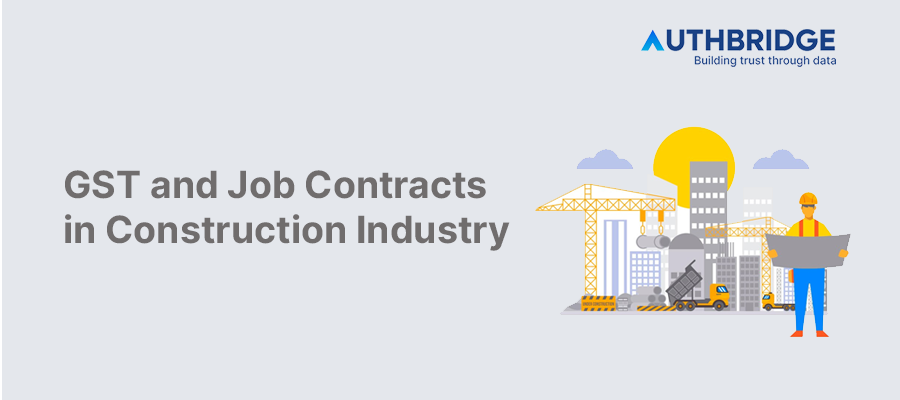Decoding GST Implications For The Construction Sector: A Closer Look At Job Contracts And Tax Credits

Complexity Before GST
Before the Goods and Services Tax (GST) was introduced, the construction industry grappled with a plethora of taxes, including VAT, Service Tax, and Central Excise. This made taxation not only cumbersome but also varied significantly across different states, leading to complexity in compliance and an increase in the cost of construction.
Simplification Through GST
GST has been a game-changer for the construction industry, simplifying the tax structure by amalgamating various taxes into a single unified system. It has eliminated the cascading effect of taxes, where tax was levied on tax, thereby reducing the overall cost of construction to some extent.
GST: A Unified Tax System
The introduction of GST has brought about a uniform tax regime across the country, making it easier for businesses to comply with tax regulations. It has also streamlined the process of tax calculation, making it transparent and straightforward. The GST regime classifies construction activities as a supply of services, simplifying the tax implications on works contracts which earlier involved a combination of goods and services.
Important GST Services for the Construction Industry
GST Registration Online
For businesses involved in the construction industry, obtaining GST registration is the first step towards compliance. The process has been made user-friendly and can be completed online, making it accessible to all businesses, irrespective of their size.
GST Return Filings
Regular filing of GST returns is mandatory for businesses to remain compliant. The construction industry, in particular, requires meticulous record-keeping and timely filing of returns to avoid penalties.
Specific Services: Construction, Hotels, Exporters
The GST regime offers specific services tailored for various sectors within the construction industry, including specialized return filings for construction services, hotels, and exporters. This ensures that businesses can manage their tax liabilities efficiently based on their specific industry requirements.
Applicability of GST on Construction
Understanding GST in Construction
The Goods and Services Tax (GST) has significantly transformed the taxation landscape in India, especially in the construction sector. It has replaced a slew of earlier taxes such as VAT, service tax, and excise duty, thereby simplifying the tax structure and making it more transparent. The applicability of GST on construction activities is broad, encompassing various aspects of construction, whether it is a private, commercial, or residential project.
Key Points on GST Applicability
- Under-Construction Properties: GST is applicable to properties under construction, intended for sale. It is considered a supply of service, attracting GST. Notably, completed properties that are ready for sale do not attract GST, making it crucial for buyers to understand the status of the property they are investing in.
- Sale of Properties: The sale of under-construction properties is liable for GST. However, there's a clear exemption for properties where the entire consideration is received after obtaining the completion certificate. Such transactions are not considered a supply of services and are exempt from GST.
- Exemptions and Concessions: The GST regime offers certain exemptions and reduced rates for specific construction activities. Affordable housing projects, for example, enjoy a reduced GST rate, aimed at promoting such housing in India. Similarly, construction services provided under government schemes like the Pradhan Mantri Awas Yojana (PMAY) may be exempt from GST, supporting governmental efforts towards providing affordable housing.
- E-Way Bill Requirements: For the transportation of construction materials exceeding a certain value threshold, e-way bills are required. This measure ensures the tracking of goods movement and compliance with GST regulations, particularly for high-value consignments of building materials.
- Invoice Requirements: Businesses engaged in construction services must adhere to GST regulations by issuing invoices for their services, especially if they are registered under GST. This practice ensures transparency and enables the accurate computation of GST liabilities.
Detailed Insights
The introduction of GST has streamlined the tax implications on construction activities, making the process more uniform and less cumbersome. However, the actual impact and the rate of GST depend on various factors, including the nature of the construction project, the value of the property, and the specifics of the transaction involved.
For under-construction properties, GST is a significant consideration. The rate applied can vary, with a standard rate for most properties and a reduced rate for affordable housing, aiming to make housing more accessible to a broader segment of the population. It's important for both buyers and sellers to understand these nuances to make informed decisions.
Moreover, the requirement for e-way bills for the transportation of construction materials adds another layer of compliance. This ensures that the movement of goods is properly documented and taxed appropriately, aligning with the overall objectives of GST to bring about transparency and efficiency in taxation.
Businesses involved in construction must be diligent in their invoicing practices, ensuring that all transactions are accurately captured and GST liabilities are correctly calculated. This not only aids in compliance but also facilitates the proper claiming of Input Tax Credit (ITC), where applicable.
In conclusion, the applicability of GST on construction activities is a critical aspect that stakeholders in the construction sector must navigate carefully. Understanding the specific provisions, exemptions, and compliance requirements is essential for smooth operations and adherence to the tax regime.
Category

Abhinandan Banerjee
(Associate Manager - Marketing)
Abhinandan is a dynamic Product and Content Marketer, boasting over seven years of experience in crafting impactful marketing strategies across diverse environments. Known for his strategic insights, he propels digital growth and boosts brand visibility by transforming complex ideas into compelling content that inspires action.



